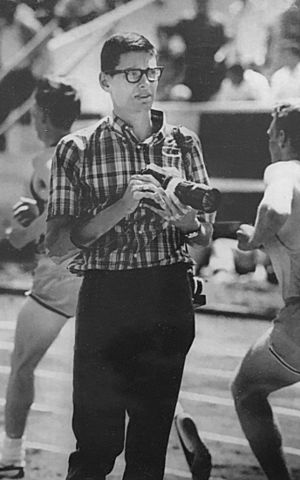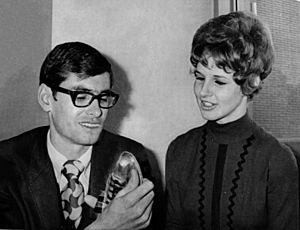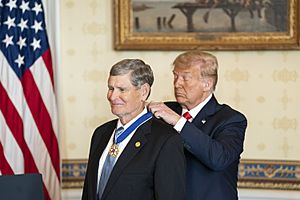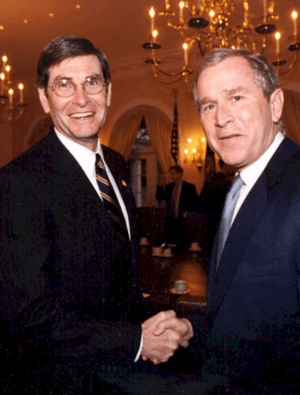Jim Ryun facts for kids
Quick facts for kids
Jim Ryun
|
||||||||||||||||||||||||||||||||||||||||
|---|---|---|---|---|---|---|---|---|---|---|---|---|---|---|---|---|---|---|---|---|---|---|---|---|---|---|---|---|---|---|---|---|---|---|---|---|---|---|---|---|
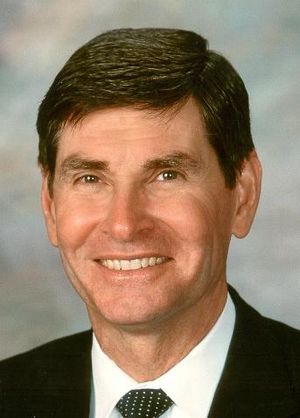 |
||||||||||||||||||||||||||||||||||||||||
| Member of the U.S. House of Representatives from Kansas's 2nd district |
||||||||||||||||||||||||||||||||||||||||
| In office November 27, 1996 – January 3, 2007 |
||||||||||||||||||||||||||||||||||||||||
| Preceded by | Sam Brownback | |||||||||||||||||||||||||||||||||||||||
| Succeeded by | Nancy Boyda | |||||||||||||||||||||||||||||||||||||||
| Personal details | ||||||||||||||||||||||||||||||||||||||||
| Born |
James Ronald Ryun
April 29, 1947 Wichita, Kansas, U.S. |
|||||||||||||||||||||||||||||||||||||||
| Political party | Republican | |||||||||||||||||||||||||||||||||||||||
| Spouse |
Anne Ryun
(m. 1969) |
|||||||||||||||||||||||||||||||||||||||
| Residence | Washington, D.C. | |||||||||||||||||||||||||||||||||||||||
| Alma mater | University of Kansas | |||||||||||||||||||||||||||||||||||||||
| Occupation | Athlete, sports management executive | |||||||||||||||||||||||||||||||||||||||
|
||||||||||||||||||||||||||||||||||||||||
James Ronald Ryun (born April 29, 1947) is an American former Republican politician and Olympic track and field athlete, who at his peak was widely considered the world's top middle-distance runner. He won a silver medal in the 1500 m at the 1968 Summer Olympics, and was the first high school athlete to run a mile in under four minutes. He is the last American to hold the world record in the mile run. Ryun later served in the United States House of Representatives from 1996 to 2007, representing Kansas's 2nd congressional district.
Contents
Athletics
According to Ryun, he began running because
I couldn't do anything else. When you're cut from the church baseball team, the junior high basketball team, and you can't make the junior high track and field team ...
I'd go to bed at night and I'd say, "Dear God, please help me do better at sports and let me find a good sport I am good at" I found myself trying out for the cross-country team and running two miles even though I'd never run that distance before. All of a sudden, I made the team, I got a letter jacket, and I started thinking there's a girlfriend behind the letter jacket. But that's how it all began.
Early years
In 1964, as a high school junior at Wichita East High School, Ryun became the first high school athlete to run a mile in under 4 minutes in the time of 3:59.0, when he took 8th place at the 1964 California Relays, the last under four minutes in a historic mass finish under 4:00. His time of 3:55.3, set winning the 1965 AAU Championship race ahead of Olympic gold medalist and former WR holder Peter Snell, was a high school record that stood for 36 years. Ryun ran five sub-four minute miles while in high school including the first sub-four minute mile run in a high school event, a 3:58.3, at the 1965 Kansas HS state meet. As a high school senior he was voted the fourth best miler in the world by Track & Field News. ESPN.com named him the best high school athlete of all time, beating out people such as Tiger Woods and LeBron James. He was Track and Field News "High School Athlete of the Year" in 1965.
Post-high school
In 1966, at age nineteen, Ryun set two world records, first in the half-mile (1:44.9) then the mile (3:51.3). He received numerous awards, including Sports Illustrated magazine's "Sportsman of the Year" award, the James E. Sullivan Award as the nation's top amateur athlete, the ABC's Wide World of Sports Athlete of the Year award, and the Track & Field News' Athlete of the Year award as the world's best track & field athlete.
In 1967, Ryun set a world record in the indoor half mile (1:48.3) and the outdoor mile from (3:51.1), a record that stood for almost eight years. That same year he set the world record for the 1,500 meters (3:33.1). In NCAA competition, Ryun was the 1967 NCAA outdoor mile champion. He was also the NCAA indoor mile champion in 1967, 1968, and 1969.
Ryun still holds the American junior (19 and under) records at one mile (3:51.3) and two miles (8:25.1). His American junior record in the 1,500 meters of 3:36.1 was broken by Hobbs Kessler on May 29, 2021, awaiting ratification by USA Track and Field. His American junior record in the 800 meters lasted exactly 50 years. In all, he broke the American record for the mile four times: once as a high school senior (3:55.3 on June 27, 1965), twice as a college freshman (3:53.7 on June 4, 1966, and 3:51.3 on July 17, 1966), and once as a college sophomore (3:51.1 on June 23, 1967).
Ryun participated in the 1964, 1968, and 1972 Summer Olympics. At age 17 years, 137 days in 1964, he remains the second youngest American male track athlete to ever qualify for the Olympics, behind Quincy Wilson. In 1968, he won the silver medal in the 1,500 meters in Mexico City, losing to Kip Keino from Kenya, whose remarkable race remained the Olympic 1,500-meter record for 16 years. Before the race, Ryun had thought that a time of 3:39 would be good enough to win in the high altitude of Mexico City. He ended up running faster than that with a 3:37.8, but half-way through the race Keino had moved into the first position at world record pace. Ryun continued to move up during the last two laps from eighth to second but was never closer than about 30 yards from Keino, who finished in 3:34.91, an Olympic record that would stand until 1984, despite the altitude. Years later, in 1981, he told Tex Maule in an interview for The Runner magazine, "We had thought that 3:39 would win and I ran under that. I considered it like winning a gold medal; I had done my very best and I still believe I would have won at sea level." Ryun was attacked by some writers who believed he had let his nation down. "Some even said I had let down the whole world. I didn't get any credit for running my best and no one seemed to realize that Keino had performed brilliantly." In the 1972 Munich, Germany, Games, he was tripped and fell down during a 1,500-meter qualifying heat. Although the International Olympic Committee (IOC) acknowledged that a foul had occurred, U.S. appeals to have Ryun reinstated in the competition were denied by the IOC.
Ryun's 1,500-meter world record, run in the Los Angeles Memorial Coliseum during the United States vs. British Commonwealth meet in July 1967, was one of Ryun's greatest running performances. Track and Field News reported that "after 220 yards of dawdling, a record seemed out of the question." However, after 440 yards, which Ryun, in third, passed in 60.9 seconds, Kip Keino took the lead and ran the next lap in 56 seconds (the fastest second lap ever run at the time). Ryun, just behind, passed the 880-yard mark in 1:57.0. At 1,320 yards the two were side by side in 2:55.0. Ryun pulled away to finish in 3:33.1, a record that stood for seven years. With a last 440 yards of 53.9, a last 880 yards of 1:51.3, and the final 1320 yards in 2:47.4, Cordner Nelson of Track and Field News called it "the mightiest finishing drive ever seen," and said of Ryun's performance, "This was most certainly his greatest race."
Ryun's final season as an amateur was in 1972, and included the third-best mile of his career (at the time, the third fastest in history: a 3:52.8 at Toronto, Canada on July 29): a 5,000-meter career best (13:38.2 at Bakersfield, CA on May 20), and a win in the 1,500 meters at the U.S. Olympic Trials. His last race at the Olympics was a 1,500‐meter preliminary heat on September 8, 1972. He fell after a collision with Ghana's Billy Fordjour as both trailed in the last 500 meters. He got up despite being eighty meters behind and completed the heat but finished 30 meters in back of the pack and did not qualify for the final. He left amateur athletics after 1972 and for the next two years ran professionally on the International Track Association circuit.
World records
| Distance | Time | Date | City |
|---|---|---|---|
| 880 yards | 1:44.9 | June 10, 1966 | Terre Haute, IN |
| 880 yards (indoor) | 1:48.3 | 1967 | |
| 1,500 meters | 3:33.1 | July 8, 1967 | Los Angeles, CA |
| One Mile | 3:51.3 | July 17, 1966 | Berkeley, CA |
| One Mile | 3:51.1 | June 23, 1967 | Bakersfield, CA |
| One Mile (indoor) | 3:56.4 | February 19, 1971 | San Diego, CA |
Notes:
- Because 880 yards is longer than 800 meters, the 1:44.9 was converted into an estimated en-route-time at 800 meters of 1:44.3, which equaled the existing 800 meters world record, but was not ratified as a record in that event. The 880 yards mark remained the world and American record until broken by Rick Wohlhuter's 1.44.6 in 1973.
- The 3:33.1 1,500 meters mark remained the world record for six years until broken by Tanzania's Filbert Bayi's 3:32.2 in 1974.
- The 3:51.1-mile mark remained the world record for eight years until broken by Bayi's 3:51.0 in 1975.
Athletic awards
- Track & Field News Athlete of the Year award for both 1966 and 1967, the first athlete to win this prestigious award two years in a row.
- 1966 Sports Illustrated Sportsman of the Year award. He also graced the cover of Sports Illustrated 5 times.
- 1966 James E. Sullivan Award, presented to the best amateur athlete in the U.S.
- 1966 ABC Wide World of Sports Athlete of the Year award
- Jim Ryun's Track & Field News World Rankings:
- 800 m (870 yd)::*1966 – 1
- 1500m/Mile
-
- 1965 – 4
- 1966 – 1
- 1967 – 1
- 1968 – 2
- 1969 – 7
- 1971 – 6
- 1972 – 9
-
In 1980, Ryun was inducted into the National Track and Field Hall of Fame and in 2003 into the National Distance Running Hall of Fame.
Ryan has competed in Masters athletics as well.
Personal life
Ryun was born in Wichita, Kansas. He now lives in Lawrence, though he was listed in the House roll as "R-Topeka". He also owns a farm in Jefferson County.
Ryun met his wife, Anne, when she asked him for an autograph after he broke the world record for the mile in Berkeley. They married in 1969 and have two sons, Ned and Drew Ryun, and seven grandchildren. He and his sons, Ned and Drew, have co-authored three books: Heroes Among Us, The Courage to Run, and In Quest of Gold – The Jim Ryun Story.
After graduating from the University of Kansas in 1970 with a degree in photojournalism, Ryun moved to Eugene, Oregon; looking for a good training situation to continue his track career. Six months later, he moved to Santa Barbara, California, where he and his family remained for nine years. He and his family moved back to Lawrence in 1981.
Raised in the Church of Christ, Ryun and his wife are members of Grace Evangelical Presbyterian Church in Lawrence.
President Donald Trump awarded Jim Ryun the Presidential Medal of Freedom on July 24, 2020.
Career prior to election to Congress
Before being elected to the House of Representatives in 1996, Ryun had operated Jim Ryun Sports, a company that ran sports camps, and worked as a motivational speaker at meetings of corporations and Christian groups around the country. Among his projects, Ryun, who has a 50% hearing loss, helped the ReSound Hearing Aid Company develop a program called Sounds of Success, aimed at helping children with hearing loss. Since 1973, Ryun and his family have hosted running camps every summer for promising high school aged runners.
House of Representatives
According to Ryun, he was interested in politics but did not have plans to run for Congress until Todd Tiahrt told him during the 1996 Summer Olympics torch relay that the Topeka-based 2nd District would have a vacancy and suggested that he run.
Elections
Ryun was first elected in 1996 to fill a seat vacated by Republican Sam Brownback. He won the three-person Republican primary with 62 percent of the vote, defeating former Topeka mayor Doug Wright and Cheryl Brown Henderson, the daughter of the plaintiff in the historic Brown v. Board of Education of Topeka desegregation case. In the general campaign, Ryun was in a tight race with Democrat John Frieden, a prominent Topeka trial attorney, who outspent Ryun $750,000 to $400,000. Ryun won that contest with 52 percent of the vote. He would not face another contest nearly that close for almost a decade; he was reelected three times with at least 60 percent of the vote.
In 2004, Democrat Nancy Boyda, a former moderate Republican, ran a campaign with spending near that of Ryun's, $1,105,838 (compared to Ryun's $1,136,464). Ryun defeated her by a margin of 55% to 42%, mainly due to the presence of George W. Bush atop the ticket.
In the 2006 election, Boyda was again the Democratic nominee, with Roger Tucker of the Reform Party of the United States of America also on the ballot. Initially expected to win, Ryun found his campaign faltering as internal polling for both his campaign and Boyda's revealed Boyda was ahead. In response, Ryun's campaign recruited both President Bush and Vice President Cheney to visit Topeka to campaign and raise campaign funds for Ryun. Ryun was defeated in an upset by Boyda, 51% to 47%.
In March 2007, Ryun confirmed that he would run for his old seat. In the Republican primary, he faced Kansas State Treasurer Lynn Jenkins, a slightly more moderate Republican who served two terms as State Treasurer, a partial term in the Kansas Senate and two years in the Kansas House. Ryun lost to Jenkins, who went on to win the seat in the general election, 51% to 46%.
Political actions
Ryun served on the Armed Services, Budget and Financial Services committees. He tallied a strongly conservative voting record.
Ryun generally supported George W. Bush's legislative agenda, voting to support it 89% of the time, average for a House member who was from the same party as the sitting president. In 2003, he voted against the $373 billion end-of-session spending bill because he considered it to be too costly and had come to Congress to support fiscal restraint.
Ryun broke with the President over two major initiatives, No Child Left Behind and Medicare reform legislation that included a prescription drug benefit. In voting against No Child Left Behind, Ryun said he believed states should have more control over their own education system. In opposing the Medicare bill, Ryun said the bill didn't provide enough reform to keep future costs from soaring.
In 2006, the National Journal rated Ryun as the nation's most conservative member of Congress. He was a member of the Republican Study Committee, a caucus of 103 fiscally and socially conservative House Republicans.
Environmental record
In 2005, Ryun scored 0 percent on the Republicans for Environmental Protection ("REP") scorecard. There were 12 issues that were considered by the REP to be critical environmental issues. Jim Ryun voted with what the REP would consider pro-environment on none of the issues voted upon. These issues consisted of the drilling of oil and natural gas, Congressman Richard Pombo's bill designed to weaken the Endangered Species Act of 1973, an amendment to the Energy Policy Act of 2005, by Congresswoman Lois Capps to remove section 1502, a provision that would provide liability protection for manufacturers of the gasoline additive MTBE, and the movement to increase fuel economy standards.
Ryun also scored a 0 on League of Conservation Voters's ("LCV") scorecard. Many of REP's critical issues were present on the scorecard.
In 2006, Ryun improved his REP scorecard when he voted pro-environment on 2 of 7 critical issues. This earned him a 17 percent. He voted to help reduce the impact the Army Corps of Engineers had on the environment. The issues in which he voted against the REP were ones involving oil drilling in the Arctic National Wildlife Refuge, renewable resource programs, and the movement to end debate and accept the Gulf of Mexico Energy Security Act.
See also
 In Spanish: Jim Ryun para niños
In Spanish: Jim Ryun para niños


